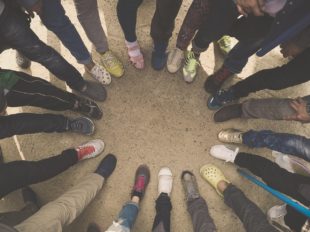Codependency: CoDA 12 Steps and Promises
Christian Counselor Spokane
Codependency is a word you have probably heard in conversation, on the TV, or read about. It can commonly be misused and overused, but when a person is struggling with codependency it can be a difficult road to travel alone. Below I have gathered information from Codependent Anonymous World (CoDA) to give a brief overview of what you could expect by joining a local group.
 After finding a meeting from the CoDA Meeting Locator, you should call the contact person to confirm the meeting date, time, and location. You may have noticed this person is identified by first name, and last initial.
After finding a meeting from the CoDA Meeting Locator, you should call the contact person to confirm the meeting date, time, and location. You may have noticed this person is identified by first name, and last initial.
This follows the CoDA tradition of anonymity, which says that members are not identified to the world-at-large. They also remain anonymous during meetings, using only first names. Information shared at meetings is not discussed outside the meeting. These safeguards ensure that all things shared are held in strict confidence and trust.
Most meetings have between five and twenty-five people and last one hour or one-and-a-half hours. Someone may welcome you to the group. Most meetings follow a format; the leader will read from it and ask volunteers to read different items. If you would like to see what Basic Meeting Format looks like, please see the Meeting Handbook.
At your first meeting, you may have many questions. You may ask questions before the meeting starts, or after the meeting ends. The meeting is about people sharing their thoughts, feelings, and experiences.
At the beginning of a meeting, there will be introductions and readings. During the introductions, some people will say “Hi, my name is Sally.” Others may add “… and I am codependent” or “… and I am a gratefully recovering codependent.” You may be asked to introduce yourself.
You could add that you are checking out meetings for the first time, though you do not have to speak at all – it is your choice. Readings are usually the Preamble, which tells a bit about the organization, and the Welcome, which tells about codependency. The information in these can be especially useful.
Other readings are the Twelve Steps and the Twelve Traditions. Statements like “… turn my will and my life over to the care of God as we understood God” or “… made a searching and fearless moral inventory of ourselves” may be uncomfortable to hear.
 You will hear people share about their unique concepts of God, and you may hear different names for this being, such as Higher Power, Creator, Great Spirit – the list goes on. You may hear people share pieces of their moral inventories. Some members work these steps quickly, others slowly. There is no right or wrong way – it is suggested that you work them at your own pace.
You will hear people share about their unique concepts of God, and you may hear different names for this being, such as Higher Power, Creator, Great Spirit – the list goes on. You may hear people share pieces of their moral inventories. Some members work these steps quickly, others slowly. There is no right or wrong way – it is suggested that you work them at your own pace.
About God, CoDA is a spiritual program, not a religious one. Nor is it a cult. Members often start, and continue, with no experience of nor belief in God. It is suggested that people new to CoDA keep an open mind about spiritual matters. Many have come to understand spirituality in a way that works for them. The CoDA program uses the word God to describe a power greater than ourselves. What a person chooses to imagine or call that power (if anything) is up to them.
Meetings have both structure and ground rules. You will notice that everyone is silent when one person is sharing. This is even though participants, including yourself, may have questions or suggestions for the person sharing. That rule is called “no cross-talk.”
Included in this is the rule to not refer to another person or their sharing when your time comes to share. We speak about our own experience and no one else’s. These rules are valuable because they allow the truth to come through our sharing. If you are unsure about what “no cross-talk” means, please ask someone after the meeting.
Some meetings go around the room where people share in turn. Others are free form, where people share as they are moved to. People share about their current life issues. You may share yours or not. If you have questions about your situation, share them first. Something may amazingly come to you. If not, ask questions later, after the regular meeting has concluded.
A sign-up list of first names may go around, with phone numbers. You may sign or not. You might find this list useful in that you are free to call any person listed to talk with them about the program, including the questions you have.
 At the end of the meeting, the group rises to say a prayer, holding hands. It is frequently The Serenity Prayer, which is well known in all 12 step programs. No participant is required to recite any prayer they find objectionable.
At the end of the meeting, the group rises to say a prayer, holding hands. It is frequently The Serenity Prayer, which is well known in all 12 step programs. No participant is required to recite any prayer they find objectionable.
It takes great courage to admit there is a problem. It takes even more to take action and seek out help. After attending your first meeting, you may be wondering if CoDA is right for you. You should attend at least six meetings (different ones, if available where you live) before making your decision.
CODA 12 Steps
- We admitted we were powerless over others – that our lives had become unmanageable.
- We came to believe that a power greater than ourselves could restore us to sanity.
- We decided to turn our will and lives over to the care of God as we understood God.
- We made a searching and fearless moral inventory of ourselves.
- We admitted to God, to ourselves, and another human being, the exact nature of our wrongs.
- We were entirely ready to have God remove all these defects of character.
- We humbly asked God to remove our shortcomings.
- We made a list of all persons we had harmed and became willing to make amends to them all.
- We made direct amends to such people wherever possible, except when to do so would injure them or others.
- We continued to take personal inventory and when we were wrong, promptly admitted it.
- We sought through prayer and meditation to improve our conscious contact with God as we understood God, praying only for knowledge of God’s will for us and the power to carry that out.
- Having had a spiritual awakening as the result of these steps, we tried to carry this message to other codependents and to practice these principles in all our affairs.
 CODA 12 Promises
CODA 12 Promises
- I know a new sense of belonging. The feeling of emptiness and loneliness will disappear.
- I am no longer controlled by my fears. I overcome my fears and act with courage, integrity, and dignity.
- I know a new freedom.
- I release myself from worry, guilt, and regret about my past and present. I am aware enough not to repeat it.
- I know a new love and acceptance of myself and others. I feel genuinely lovable, loving, and loved.
- I learn to see myself as equal to others. My new and renewed relationships are all with equal partners.
- I am capable of developing and maintaining healthy and loving relationships. The need to control and manipulate others will disappear as I learn to trust those who are trustworthy.
- I learn that it is possible to mend – to become more loving, intimate, and supportive. I have the choice of communicating with my family in a way that is safe for me and respectful of them.
- I acknowledge that I am a unique and precious creation.
- I no longer need to rely solely on others to provide my sense of worth.
- I trust the guidance I receive from my higher power and come to believe in my own capabilities.
- I gradually experience serenity, strength, and spiritual growth in my daily life.
Christian Counseling for Codependency
I hope you have found this information helpful and if you are considering joining or suggesting a CoDA group to a loved one you can take that next step in the journey. The power of sharing your story with people who understand the struggle can supply spiritual and emotional healing that cannot be found elsewhere. I hope you find the courage to start your journey.
If you’re looking for additional individual support, consider Christian counseling for codependency. Feel free to contact me or one of the other counselors listed in the counselor directory.
“Sitting on the Dock”, Courtesy of Keenan Constance, Pexels.com, CC0 License; “Boardwalk”, Courtesy of Tobi, Pexels.com, CC0 License; “Women Walking”, Courtesy of Pille Kirsi, Pexels.com, CC0 License; “One Foot In”, Courtesy of Tirachard Kumtanom, Pexels.com, CC0 License





